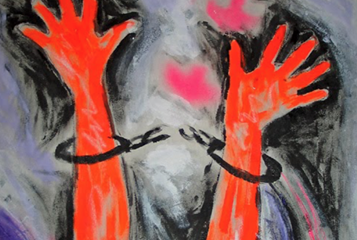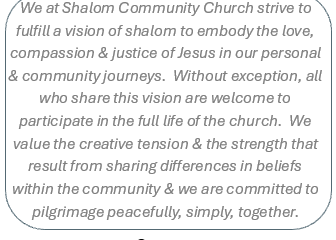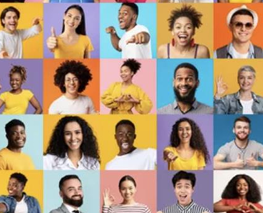Zoom fatigue and working from home.
Cinda Nofziger
Working from home at this time, for me anyway, is fraught, complex, contradictory. I am intensely grateful to be working from home, to still have an excellent job, and to lessen my exposure and my chances of exposing others. Nonetheless working from home isn’t always easy.
It isn’t always hard either. I recognize that I am privileged to stay home, to have a partner who is not working and can help with childcare and grocery store runs, and a home that has a yard for outside activities. We haven’t been sick.
It’s maybe a knot of love and responsibility and concern and fear and stress and anxiety and jazzercise and stories and family and masks and frustration and not enough time and too much time and minecraft and zoom and slack and google meet and little boxes on a screen and hope and walks and hugs and sunshine and gardens and cookies and m&ms and soccer and paper airplanes and camping in the yard and being stuck and not marching but wanting to and seesaw and meetings and meetings and meetings swirling around together.
Sometimes the knot of those things feels loose, and it is possible to see the different threads and other times it is tight, matted and impossible to untangle.
I’m going to pull on a couple of threads in that knot to talk about what the past few months have been like for me.
Sometimes as I think about our current moment, I search my mind for other similar experiences. One is the first few months after Jackson was born, when time behaved strangely and my focus altered dramatically. Days of the week didn’t matter much, night and day blended together and sleep was hard to come by. Those aspects are certainly part of what I’m calling “the now.” There was, of course, something precious about that time. Our little family focused on each other as we adjusted and sometimes struggled to come to terms with our new normal. Our interactions with others were limited, as friends and family, after initial visits, gave us space to find our way together. That time was undoubtedly much more joyful than now, but as I search for something familiar in this time, that is a time that I return to.
I also occasionally find myself comparing living through this pandemic with being on an extended road trip. I don’t mean the vacation-y parts or the sightseeing, but the way that being on a road trip can serve to suspend everything that isn’t necessary. The focus narrows to what can be managed and what is necessary–where will we eat? Where will we stay? How much longer? The focus narrows to the inside of the car, and what can be seen through the windows. Wearing the same clothes for days at a time is acceptable, and bathing optional. It is not the same as the now, but thinking about those times helps to offer some perspective and familiarity about the now.
But also, there is nothing familiar about this time, except that the now is normal now. I don’t remember all the details, so don’t ask me for a citation, but in a class in information school, a professor told us it takes about three months for us to become accustomed to a new normal, not for them to become fine, but for them to become normalized. So here we are. And the now is of course different than my first few months as a parent,or the times I’ve spent weeks or months I’ve spent on the road. Things have changed because of a global pandemic, and I am still working.
My work almost exclusively takes place at our kitchen table. Our rather small home doesn’t have space to set up an extra workspace in either of our two bedrooms and the living room and kitchen blend together. Brad and Jackson are both home as well; Brad’s been on furlough since March. So, I’m always in the middle of whatever else is happening in the house, and Jackson and Brad are likewise always aware of what I’m doing. I work as an archivist for the Bentley Historical library–I first wrote “at the Bentley,” but that’s not really accurate anymore. Much of my work involves working with people, with researchers in the reading room and students and faculty who use our materials for large and small projects. I knew when we were sent home in March that my work would change. The reference staff now answers questions remotely via email and most of the teaching with collections that takes up most of my time stopped. That was expected. What was less expected or what I hadn’t really realized was how much of the rest of my job takes place through conversations. Both scheduled and unscheduled meetings with colleagues about various projects, meetings with faculty about class plans, meetings with others in the university community and wider archival community. Most of that work happens in conversation and since March those conversations have happened primarily through Zoom, the video conferencing platform. And they haven’t lessened.
It’s not unusual for me to spend 4-5 hours out of an 8 hour work day in meetings on zoom. I didn’t spend quite that much time in meetings when I was at the Bentley, but I will say that the Bentley tends to be a place that has a lot of meetings. That’s a lot of time interacting with people through a screen, watching people’s faces but not being able to read them in the same way, watching my own face. Experts tell us that Being on a video call requires more focus than a face-to-face chat. Video chats mean we need to work harder to process non-verbal cues like facial expressions, the tone and pitch of the voice, and body language; paying more attention to these consumes a lot of energy. (from https://www.bbc.com/worklife/article/20200421-why-zoom-video-chats-are-so-exhausting). Zoom fatigue seems to be made worse when more people are in a meeting. Furthermore, during the pandemic, video calls are also a reminder of what is different, how we are unable to connect in normal ways. That reminder gives the calls an added stress. I feel this especially when using a video call to talk with my family. I watched Jackson experience it when he was supposed to have class meetings with his teacher, and in his desire to not video chat with his friends. He’d rather not have the reminder of not being able to be with them in person.
I identified my own zoom fatigue pretty early. I think there was a lot of initial excitement from various parties, in addition to my work, to move things online–online workouts, online art classes for kids, video calls to long lost friends. We established a weekly call with my parents and extended family in Alaska and my sister in Seattle. Each week for what we call “family lunch” we use google meet to talk. In addition to that there was just work. As I said, I probably average 4-5 hours of zoom meetings per day just as part of my job. When I’m done with my workday I am exhausted and it’s a struggle to do anything virtual–with family, friends, or others. My eyes hurt, my brain is fried and my body is stiff and sore.
We’ve been doing this for three months now, and I have figured out some ways to manage this fatigue. I can’t do much about work, though when I have control of setting meetings, I try to give myself time between them, and to not overload them on a particular day. I try to not have zoom meetings when we can do our work without them. I also try to limit my zoom interactions in other ways. Some of you may have noticed that we’ve limited our church attendance and we also don’t usually have our video on. I still enjoy seeing and hearing all of you! I’ve taken to making cookies while I listen to church (usually chocolate chips). Similarly, I limit our participation in my family’s “family lunch” meetings. This has been really hard because it is both wonderful to see them but also really difficult. Jackson has felt that contradiction especially I think. When the family talks about their health concerns or anxiety about the virus, the virtual presence and real absence of people is too much for him. As they have been able to see each other in person a bit more over the past few weeks, we’ve experienced jealousy and sadness. As hard as it is to click accept on a zoom meeting with family, I always feel better in the end. This is hard but it’s better to do than to not.
I also workout. I’ve realized that I need a strong workout in the morning, to prepare for a day of meetings and another in the afternoon to recalibrate my body. I teach jazzercise virtually on facebook live from my living room. I practice jazzercise. I run. I bike. I play basketball, and soccer with the boys .I walk. These activities help me return to my body, to remind my brain that I am more than a square on a screen.
And now we are here, three months in and looking at opening things back up. I don’t know how my work will change. I don’t know that I’ll be able to go back to work at the Bentley for a while. But here I think some lessons from those early months with Jackson, or time on the road can be useful. We keep going, living in the now. As Mason Jennings sings, ‘Be here now. There’s no other place to be… The sun comes up and we start again. The sun comes up and we start again.”



0 Comments